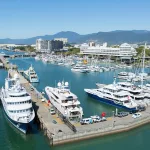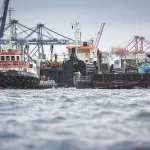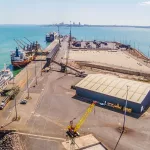With a focus on local people, partnerships and investment, Bishops are driving economic progression across the Pacific Islands.
DRIVING NATIONAL DEVELOPMENT
Papua New Guinea (PNG) and the Solomon Islands are two countries that are ripe for industrial development.
According to statistics from the World Bank, Papua New Guinea’s industrial sector accounted for 44 percent of the country’s total GDP in 2012. Whilst such a statistic highlights the importance of PNG’s key industries, such as its mining and energy sectors, many of its natural resources are still considered to be relatively untapped.
It is these unexploited resources that hold significant potential in powering the economic development of the Pacific Islands, something that will significantly benefit the region’s economy and population if managed in the right way.
Outlining its own recommend strategy for PNG, the World Bank states the following: “The current strategy aims to ensure everyone, regardless of their gender, where they live, or their social and economic circumstances, will benefit equally from Papua New Guinea’s development goals.”
Whilst there is speculation over whether such a strategy will be pursued, some that are already heavily involved in both PNG and the wider region’s development processes are ungrudgingly recognising these potential opportunities for the local community.
One such company is Bishops.
A BRIEF HISTORY
“Built from humble beginnings in 1972 and a philosophy of continuously reinvesting in the business and quickly responding to the needs of our customers and the community, Bishops has grown to become a brand synonymous with supporting industry in Papua New Guinea,” Len Pianta, the Company’s General Manager, explains.
Formed from the combined entrepreneurship and hard work of three brothers, Bishops was borne out of the creation of two maintenance and machining workshops 45 years ago in Port Moresby and Lae on PNG’s southern and eastern shores.
Building from this foundation, the firm soon established a successful supply chain and procurement function and excelled. Pianta continues: “Before long branches had been established across the country to service the increasing manufacturing and mining industries taking shape in PNG.”
Having continued to develop its own network, the Company now employs more than 300 local staff throughout its seven industrial branches that are situated across PNG and the Solomon Islands.
As a result, Bishops is now known as the largest supplier of industrial, engineering and safety products across both PNG and the Solomon Islands, serving the mining and exploration, oil & gas, construction, infrastructure, transport and manufacturing industries, amongst others.
STAVING OFF THE COMPETITION
Establishing this title has not been an easy task for Bishops and maintaining its status has proved to be all the more challenging.
As the Solomon Islands and PNG have continually placed greater emphasis on developing and investing in key industries and infrastructure, this too has attracted increasing interest from international rivals.
“The industry is very competitive with the largest competition coming from companies sourcing out of Australia and throughout the Asia region,” Pianta explains.
To reinforce its position in the face of such pressure, Bishops has dedicated itself to pursuing its key philosophies of placing its customers and the local community before all else – something that has become culturally accepted and appreciated within the Pacific Islands.
“The thing that defines Bishops is the service culture: We exist to serve,” says Pianta. “When newcomers to PNG or the Solomon Islands ask where to get their industrial, engineering or safety needs, locals simply reply: Get it at Bishops.”
LOCAL INVESTMENT
This ethos is further reflected in the Company’s approach to local investment.
Despite a significant number of multinational businesses centralising their operations in order to reduce costs and maximise profits, Bishops has continued reinvest into PNG and the Solomon Islands.
The results of this approach can be seen in the company’s Port Moresby (10,000 square metres), Lae (8,000 square metres), Mt Hagen (4,000 square metres), and Kimbe (4,000 square metres) facilities, each of which have been constructed in the last 10 years.
“Call it old fashioned, but this philosophy has served the local industry well, and is not something Bishops is about to change,” Pianta explains.
With such a substantial network, the Company now currently holds more than 50 million kina of stock, bought in from all over the world, that is ready to solely be used in supporting the development of local industry.
“Together with a dedicated sourcing team capable of finding and importing just about anything a customer could need to get the job done, Bishops has grown to become a truly one-stop-shop for local industry,” Pianta adds.
PROMOTING PARTNERSHIPS
The second pillar of the World Bank’s strategy for PNG involves a key focus on “encouraging public-private collaboration opportunities to facilitate business and investment, while removing impediments and inefficiencies in regulation and reducing business costs”, something that Bishops is also actively following.
One such example of this is the company’s role in the development of PNG’s first ever LNG project.
During construction, Bishops ensured that the project had a continued supply of necessary equipment and key materials throughout the process – a testament to the success of its extensive procurement function.
The firm also continues to enjoy other close collaborations within the oil & gas industry, evident in its partnerships with Exxon Mobile and Total SA, amongst other leading names throughout the region.
Moreover, the company is also exploring potential joint ventures at both Tabubil and Lihir Island in the aim of better serving its clients Ok Tedi Mining and Newcrest.
“Bishops is geared to work closely with businesses, whether they be a mining or oil & gas major, or a small local business,” clarifies Pianta.
EMPLOYMENT PRACTICES
The second pillar also places emphasis on “providing disadvantaged young people – particularly those in urban areas – with training, apprenticeships and short-term employment to increase their employability, and create job opportunities”.
Much like its commitment to investing in developing industry, Bishops takes pride in ensuring that the local population plays a key role in the continued success of the Company and vice versa.
According to statistics from the United Nations Population Fund, approximately 60 percent of the total inhabitants of PNG are under the age of 25, equating to more than 7.3 million people.
With such a significant pool of labour on its doorstep, Bishops looks to ensure that such talent is not wasted by running internal training programmes for local employees, giving them a platform to develop their personal skills.
“Culturally it is important to include the local community in the operations of a local branch, and Bishops sees the value in locals serving locals, as they tend to be more accountable,” Pianta says. “With more than 40 years in business, some employees of Bishops have retired only ever knowing one employer, and we are very proud of this.”
With a truly human outlook, and such a strong ethical approach, it is easy to see why Bishops has been able to entrench itself as the one-stop-shop for local industry across both PNG and the Solomon Islands.































